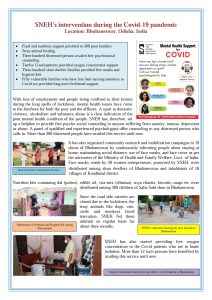
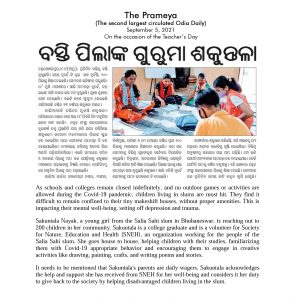
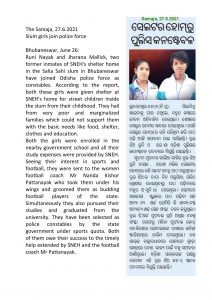
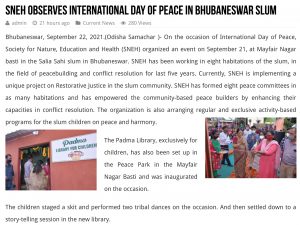
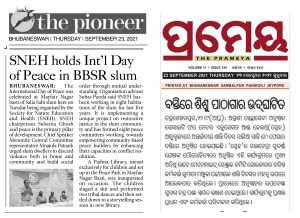
SNEH’s Response to COVID-19
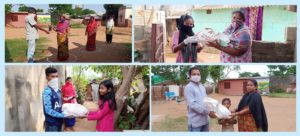
SNEH reached about 3000 marginalized small and petty businesswomen in 10 slums in Bhubaneswar, whose businesses were completely disrupted by the impact of lockdown due to COVID-19 pandemic. It has also organized community outreach and mobilization campaigns in those slums by continuously informing people about staying at home, maintaining social distance, use of face masks, and face cover as per the advisories of the Ministry of Health and Family Welfare. Face masks, made by 30 women entrepreneurs, promoted by SNEH, were distributed among slum dwellers of Bhubaneswar and inhabitants of 18 villages of Kandhmal district.
Nutrition kits containing dal (pulses), edible oil, vita-mix (chhatua), soya chunks, biscuits, soaps etc were distributed among 100 children of Salia Sahi slum in Bhubaneswar.
SNEH’s Response to COVID-19
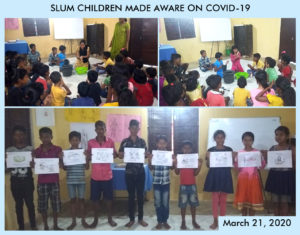
The unprecedented humanitarian crisis created by the COVID-19 pandemic across the globe has adversely impacted the lives and livelihoods of marginalized sections of the society with whom SNEH has been engaged since long. The daily wage earners, petty traders, street vendors, construction labourers and unorganized work force suffer the most. The people living in sub-human living conditions in urban slums are unable to fend for themselves in this crisis situation when the whole country is locked down to fight the spread of Corona Virus.
SNEH has responded in its humble way to this crisis by creating awareness among various stake holders in its operational areas on personal and community hygiene and sanitation, maintaining social distance and taking precautionary measures like washing hands with alcohol based sanitizer or soaps. The children and women of Salia Sahi slum in Bhubaneswar participated in these awareness drives. The women and children were also motivated to take care of the elderly persons in their families. SNEH’s community volunteers facilitated the smooth delivery of relief assistance of the state government in the slum.
The worst sufferers in the lock down are the stray animals like dogs and cattle. SNEH’s volunteers and staff are regularly feeding these animals in the area where its office is located in Bhubaneswar and also motivating the local residents to keep their surplus food stuff outside their houses, so that, the stray animals can feed themselves. SNEH has also placed water pots in some strategic locations in the area so that these animals can drink.
In this critical time SNEH requests the citizens to confine themselves to their houses and strictly follow the social distancing and maintain personal hygiene.
PTSD PROGRAM FOR SLUM CHILDREN
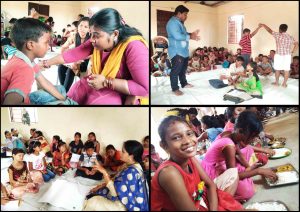
Severe cyclonic storm ‘Fani’ hit Odisha coast on May 3, wrecking havoc in Puri and Khurdha districts. The capital city of Bhubaneswar was also affected with the loss of green cover as well as mud and thatched houses of urban slums razed to the ground. The most affected are the slum dwellers who evacuated in time to the nearest safe houses. But the traumatic experience of this disaster left indelible scar on the psyche of the slum children.
The earlier experience of SNEH working with Supper Cyclone affected children of Erasama Block of Jagatsinghpur district in 1999 helped suspect Post Traumatic Stress Disorder (PTSD) among these slum children. A team of psychologists were consulted and a PTSD program for the affected children launched in the area. Through various creative and recreational activities, individual and group counseling sessions by the trained staff and external resource persons like psychologists and theatre activists, the affected children learnt the coping skills to handle the trauma. Since the schools were closed for summer vacation the poor slum children were deprived of the free mid-day meals. Therefore, a nutritious mid-day meal is also served to about 100 slum children who are participants of this PTSD program.
